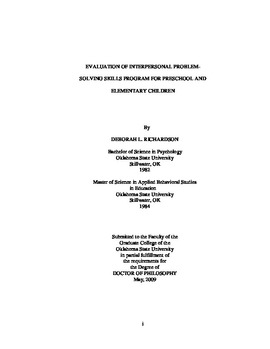| dc.contributor.advisor | Harrist, Amanda W. | |
| dc.contributor.author | Richardson, Deborah L. | |
| dc.date.accessioned | 2013-12-10T18:04:21Z | |
| dc.date.available | 2013-12-10T18:04:21Z | |
| dc.date.issued | 2009-05 | |
| dc.identifier.uri | https://hdl.handle.net/11244/7711 | |
| dc.description.abstract | Scope and Method of Study: The effects of the I Can Problem Solve (ICPS; Shure, 2000) program utilizing the Cooperative Extension Service (CES) system in partnership with teachers of children in preschool through second grades are examined. Convenience sampling and a quasi-experimental control group design were employed. From primarily rural elementary schools, Head Start, and child development centers, 368 children and 34 teachers serve as participants for the present study, 212 students and 17 teachers in the intervention group, and 156 students and 17 teachers in the control group. Evaluation measures included child interviews, teacher ratings of child behavior, and teacher and extension educator assessments of program delivery. Analyses focused on research questions and hypotheses surrounding the impact of the ICPS program on children's social-cognitive skills and social competence. The ICPS program has not been adapted or broadly utilized in a statewide initiative or through the CES. Literature appears to lack evaluation of the program in rural communities and examination of implementation factors. This study contributes to this knowledge. | |
| dc.description.abstract | Findings and Conclusions: Results indicate partial support for the hypotheses. Children in ICPS intervention classrooms showed significant positive changes in some social problem-solving skills and competent behaviors from pre-test to post-test when compared to control peers. The quantity of alternative solutions improved and the quantity and ratio of initial relevant solution responses did to a lesser, albeit still significant, extent. Improvements also emerged in the number of non-aggressive manipulative, react positive, passive, and tell-tattle solutions. Effects improved for some indicators when preschool children were removed from analyses. ICPS-trained children also demonstrated significantly greater behavior improvements on overall social competence, aggression, prosocial skills, emotional regulation, and academic skills. Findings suggest that the ICPS program may be beneficial for a diverse general population of children in primarily rural school and community settings. Furthermore, the CES may provide a viable system for the diffusion and implementation of ICPS in school settings which often have limited resources for research-based prevention programs. However, a number of limitations must be considered including the lesser degree of impact on preschoolers' social cognitive skills and considerable variation in the delivery of the program. | |
| dc.format | application/pdf | |
| dc.language | en_US | |
| dc.rights | Copyright is held by the author who has granted the Oklahoma State University Library the non-exclusive right to share this material in its institutional repository. Contact Digital Library Services at lib-dls@okstate.edu or 405-744-9161 for the permission policy on the use, reproduction or distribution of this material. | |
| dc.title | Evaluation of interpersonal problem-solving skills program for preschool and elementary children | |
| dc.contributor.committeeMember | Hirschlein, Beulah | |
| dc.contributor.committeeMember | Hubbs-Tait, Laura | |
| dc.contributor.committeeMember | Page, Melanie C. | |
| dc.contributor.committeeMember | Williams, Sue | |
| osu.filename | Richardson_okstate_0664D_10244.pdf | |
| osu.accesstype | Open Access | |
| dc.type.genre | Dissertation | |
| dc.type.material | Text | |
| dc.subject.keywords | cooperative extension | |
| dc.subject.keywords | preschool children | |
| dc.subject.keywords | prevention | |
| dc.subject.keywords | problem-solving | |
| dc.subject.keywords | program implementation | |
| dc.subject.keywords | school-age childr | |
| thesis.degree.discipline | Human Environmental Sciences | |
| thesis.degree.grantor | Oklahoma State University | |
